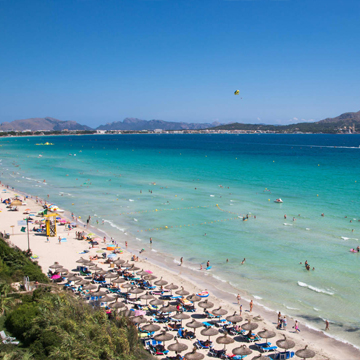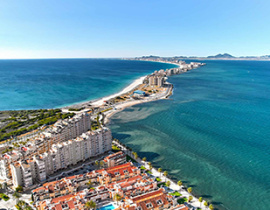- Home
- Blog
- Legislation
- Navigating Spain’s Beaches & Regulations
Navigating Spain’s Beaches & Regulations
As TEKCE professionals, we are aware that investing in Spanish real estate is about more than just property. It’s also about embracing a vibrant, sun-soaked lifestyle and the joys of coastal living. The country’s beaches are among the world’s most treasured natural wonders, thanks to the beach rules in Spain. They are drawing millions of visitors each year with their beauty and variety.
In 2025, the country has taken even greater steps to protect the natural environment. By introducing enhanced Spain beach rules, the government ensures both tourism and conservation flourish together. For real estate investors and residents, understanding these regulations and beach restrictions in Spain is key to making the most of the country’s spectacular shores.
Now, let’s start with getting to know the most visited beaches and continue with the Spain fines for illegal beach activities. This way you will be able to comprehend what to do and what not to do on Spanish beaches to have an exciting experience!
Most Popular Beaches in Spain: Top 10
Sp ain’s coastline is a tapestry of breathtaking beaches, each offering its own unique charm and lifestyle opportunities. But, of course, there are some names that stand out. Here are some of the best beaches in Spain:
ain’s coastline is a tapestry of breathtaking beaches, each offering its own unique charm and lifestyle opportunities. But, of course, there are some names that stand out. Here are some of the best beaches in Spain:
- Las Catedrales (Lugo): It is known for its dramatic rock formations and natural arches, making it a paradise for nature lovers and photographers.
- Malva-rosa (Valencia): It is a vibrant urban beach with golden sands and a lively promenade, perfect for enjoying the Mediterranean lifestyle.
- Playa de Muro (Mallorca): It offers nearly 6 kilometers of family-friendly shoreline with calm, shallow waters and excellent facilities.
- La Barceloneta (Barcelona): It is famous for its lively atmosphere, numerous restaurants, and proximity to the city’s cultural heart.
- Bolonia (Cádiz): It is a pristine stretch of sand featuring a massive dune and ancient Roman ruins, making it truly a hidden gem.
- La Concha (San Sebastián): It is renowned for its shell-shaped bay and its unique blend of city culture with beach relaxation.
- Cala Macarella & Cala Macarelleta (Menorca): They are stunning coves with crystal-clear waters and fine white sand, set among picturesque pine-covered cliffs.
- Gulpiyuri (Asturias): It is a magical inland beach formed by a sea-connected sinkhole, offering visitors a one-of-a-kind experience.
- San Juan (Alicante): It is a wide, sandy beach with top-notch facilities, beloved by both locals and tourists alike.
- Playa de Ses Illetes (Formentera): It boasts powdery white sand and turquoise waters, often drawing comparisons to the Caribbean.
These destinations showcase the incredible diversity and beauty of Spain’s coastline, making them irresistible for both lifestyle seekers and real estate investors.
Spain Beach Laws 2025: Protecting Coastal Treasures
Spain’s stunning coastline is safeguarded by the Ley de Costas (Coastal Law), a national framework that guarantees public access to beaches and prioritizes their conservation. The laws ensure that everyone can enjoy the coast while emphasizing the importance of environmental protection and sustainable use.
On top of this, each municipality has the freedom to set its own local ordinances, reflecting the unique character of regions from the lively Costa del Sol to the tranquil coves of the Balearic Islands. These thoughtful layers of regulation help maintain cleanliness, safety, and harmony, creating a welcoming environment for beachgoers, residents, and wildlife alike.
Thus, these beach laws for travelers in Spain, along with the residents, allows everyone to enjoy the country’s magnificent coastline while contributing to its preservation for generations to come.
Highest and Common Beach Fines in Spain 2025
Spain’s commitment to pristine beaches is matched by its enforcement of beach rules, with fines reaching up to €3,000 for certain violations as of today. According to the Spanish beach regulatio ns 2025, rules and fines below are designed to keep Spain’s beaches safe, clean, and enjoyable. Let’s have a closer look!
ns 2025, rules and fines below are designed to keep Spain’s beaches safe, clean, and enjoyable. Let’s have a closer look!
- Penalties for Bringing Pets onto Beaches: According to Spain beach pet regulations, pets are generally not allowed on most beaches except for guide dogs. In areas like Tarragona and Alicante, fines can reach up to €3,000 for violations.
- Penalties for Public Drinking and Alcohol Consumption: Many coastal towns, including Barcelona and Ibiza, have banned alcohol on beaches to maintain a family-friendly atmosphere. The fines for drinking alcohol on Spanish beaches range from €100 to €3,000 for such activities.
- Penalties for Smoking on Beaches: The Spain beach smoking ban 2025 has been introduced to protect public health and reduce litter on many of the beaches in the country. If you are wondering how much is the fine for smoking on beaches in Spain, it can be as high as €2,000 in some coastal towns like Barcelona and Ibiza.
- Penalties for Loud Music and Unauthorized Parties: Many coastal towns enforce music and speaker bans on Spanish beaches to keep the environment peaceful, with fines for playing loud music reaching up to €750 in places like Valencia and Badalona.
- Penalties for Unauthorized Tent Setup: Without authorization, these activities can lead to significant penalties. The camping or bonfire fines in Spain range from €30 to €3,000 depending on the location and severity of the violation.
- Penalties for Littering and Environmental Damage: Collecting shells, rocks, or leaving trash behind is strictly penalized to protect delicate habitats.
- Penalties for Nudity Violations: The nudity rules and fines in Spain beaches vary by region, with some beaches allowing nudity while others prohibit it. Violating these rules can result in fines, which are enforced to respect local customs and public decency.
- Penalties for Unauthorized Drone Usage: The drone usage ban on beaches in Spain is in place in many areas to protect privacy and wildlife. Flying drones without permission can lead to fines and confiscation of equipment.
- Penalties for Ignoring Lifeguard and Swimming Zone Rules: Following the Spain lifeguard and swimming zone rules is mandatory for safety. Swimming outside designated zones or disobeying lifeguard instructions can result in fines and increased risk of accidents.
In other words, it is better to be careful both to avoid activities that lead to penalties and to protect the natural environment. By respecting the Spanish beach fines and penalties, everyone can play a part in preserving Spain’s coastal beauty and vibrant beach culture.
Variations in Local Ordinances Across Spanish Beaches
Local towns and cities in Spain create their own beach rules to fit the needs of their communities. For example:
| Location | Local Ordinances | Typical Fines |
| Alicante | No soap is allowed in showers. | Up to €750 |
| Cádiz | Loudspeakers are banned, except for authorized use. | Up to €750 |
| Tarragona | Pets are banned from April to October. | Up to €1,500 |
| Málaga | Street food vending is prohibited. | €300 to €3,000 |
| Valencia | Unauthorized tents are banned. | €1,501 to €3,000 |
| Lekeitio | Loudspeakers are banned to reduce noise pollution. | €50 to €300 |
Thus it can be said, with each area having its own unique way of protecting and managing its beaches, Spain’s coastline is even more special and diverse. Because of these differences, anyone buying or renting property near the coast should take the time to learn about the specific beach regulations in that area.
Also, low-cost beaches in Spain tend to be less commercialized and more natural, with a strong focus on conservation rather than imposing stricter regulations. These beaches, many of which are among Spain’s hidden coastal gems, attract visitors who appreciate their unspoiled beauty and peaceful atmosphere. Instead of limiting access, local authorities implement targeted rules outlined in the Spanish beach regulations 2025 to protect delicate ecosystems and promote sustainable tourism.
While fines may be higher in ecologically sensitive areas, they reflect the effort to preserve the natural environment rather than restricting visitors. By following the beach rules in Spain we have mentioned above, visitors and residents can help maintain these beaches’ pristine condition.
Spain New Travel Rules and Their Impact on Its Beaches
Th e new rules for travelling to Spain in 2025 reflect the country's growing commitment to safety, sustainability, and a better tourist experience. As part of the Spain travel rules 2025, all visitors must provide a valid passport, travel insurance, proof of sufficient funds, and accommodation details upon entry.
e new rules for travelling to Spain in 2025 reflect the country's growing commitment to safety, sustainability, and a better tourist experience. As part of the Spain travel rules 2025, all visitors must provide a valid passport, travel insurance, proof of sufficient funds, and accommodation details upon entry.
These new rules for travel to Spain not only affect the border entry processes but also extend to how tourism is managed across the country, especially in coastal regions. Under the Spain tourist beach rules, access to beaches now requires greater responsibility from visitors. Environmental cleanliness, the protection of natural ecosystems, and sustainable tourism practices are emphasized more than ever.
Both domestic and international tourists are expected to follow these updated guidelines, contributing to increased environmental awareness and respect for nature. As a result, Spain as a sustainable destination to live and travel, also attracts long-term investors in sustainable tourism and development too.
Discover Your Dream Coastal Property with TEKCE
Whether you are drawn to the bustling shores of the Costa del Sol, the tranquil, low-cost beaches tucked away among Spain’s hidden coastal gems, or the iconic popular beaches, TEKCE serves you as your trusted partner every step of the way.
Call us today to discover how you can invest wisely in this beautiful country, embracing the best of its beautiful coastline!









